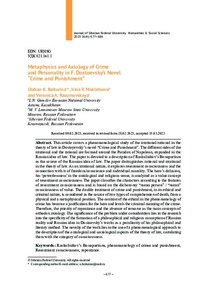Показать сокращенную информацию
Metaphysics and Axiology of Crime and Personality in F. Dostoevsky’s Novel “Crime and Punishment”
| Автор | Baiturina, Ulzhan K. | en |
| Автор | Mokletsova, Irina V. | en |
| Автор | Razumovskaya, Veronica A. | en |
| Автор | Байтурина, У. К. | ru_RU |
| Автор | Моклецова, И. В. | ru_RU |
| Автор | Разумовская, В. А. | ru_RU |
| Дата внесения | 2023-03-28T07:57:17Z | |
| Дата, когда ресурс стал доступен | 2023-03-28T07:57:17Z | |
| Дата публикации | 2023-04 | |
| URI (для ссылок/цитирований) | https://elib.sfu-kras.ru/handle/2311/150067 | |
| Аннотация | This article covers a phenomenological study of the irrational/rational in the theory of law in Dostoyevsky’s novel “Crime and Punishment”. The different sides of the irrational and the rational are focused around the Paradox of Napoleon, expanded in the Russian idea of law. The paper is devoted to a description of Raskolnikov’s Bonapartism as the source of the Russian idea of law. The paper distinguishes rational and irrational in the theory of law. As an irrational nature, it explores resentment consciousness and the connection with it of freedom/conscience and individual morality. The hero’s delusion, his ‘powerlessness’ in the ontological and religious sense, is analyzed as a value concept of resentment consciousness The paper classifies the characters according to the features of resentment consciousness and is based on the dichotomy “mean person” / “mean” consciousness of value. The double treatment of crime and punishment, in its ethical and criminal nature, is considered as the source of two types of comprehension of death, from a physical and a metaphysical position. The contrast of the ethical in the phenomenology of crime has become a justification for the hero and levels the criminal meaning of the crime. Therefore, the priority of repentance and the absence of remorse as the main concepts of orthodox axiology. The significance of the problem under consideration lies in the research into the specificity of the formation of a philosophical and religious conception of Russian reality and Russian idea in Dostoevsky’s works as a peculiarity of his philosophical and literary method. The novelty of the work lies in the use of a phenomenological approach to the description of the ontological and sociological aspects of the theory of law, correlating them with the category of consciousness | ru_RU |
| Аннотация | Статья представляет собой опыт феноменологического изучения иррационального/рационального в теории права в романе Ф. Достоевского «Преступление и наказание». Разные стороны иррационального и рационального сфокусированы вокруг парадокса Наполеона, развернутого в русскую идею права. Работа посвящена описанию бонапартизма Раскольникова как источника русской идеи права. В работе дифференцированы иррациональное и рациональное в теории права. В качестве иррациональной природы исследовано ресентиментное сознание, связь с ним свободы/совести, индивидуальной морали. В качестве ценностных понятий ресентиментного сознания анализируется заблуждение героя, его «бессилие» в онтологическом и религиозном смысле. В статье приведена классификация героев по признакам ресентиментного сознания и на основе дихотомии «подлый человек»/«подлое» ценностное сознание. Двоякая трактовка преступления и наказания в этической и криминальной природе рассмотрена как источник двух типов осмысления смерти с позиции физического и метафизического. Противопоставление этического в феноменологии преступления стало оправданием героя и нивелирует уголовный смысл преступления. Отсюда приоритетность покаяния и отсутствие раскаяния как главных концептов православной аксиологии. Значимость рассматриваемой проблемы состоит в изучении специфики становления философско – религиозной концепции русской действительности и русской идеи в творчестве Достоевского как особенности его философско – художественного метода. Новизна работы заключается в использовании феноменологического подхода для описания онтологического и социологического аспектов теории права, в корреляции с категорией сознания | ru_RU |
| Язык | en | en |
| Издатель | Сибирский федеральный университет. Siberian Federal University | en |
| Тема | Raskolnikov’s Bonapartism | en |
| Тема | phenomenology of crime and punishment | en |
| Тема | Resentment consciousness | en |
| Тема | repentance | en |
| Тема | бонапартизм Раскольникова | ru_RU |
| Тема | феноменология преступления и наказания | ru_RU |
| Тема | ресентиментное сознание | ru_RU |
| Тема | покаяние | ru_RU |
| Название | Metaphysics and Axiology of Crime and Personality in F. Dostoevsky’s Novel “Crime and Punishment” | en |
| Альтернативное название | Метафизика и аксиология преступления и личности в романе Ф. Достоевского «Преступление и наказание» | ru_RU |
| Тип | Journal Article | en |
| Контакты автора | Baiturina, Ulzhan K.: L.N. Gumilev Eurasian National University Astana, Kazakhstan; u.baiturina@mail.ru | en |
| Контакты автора | Mokletsova, Irina V.: M. V. Lomonosov Moscow State University Moscow, Russian Federation | en |
| Контакты автора | Razumovskaya, Veronica A.: Siberian Federal University Krasnoyarsk, Russian Federation | en |
| Контакты автора | Байтурина, У. К.: Евразийский национальный университет им. Л. Н. Гумилева Казахстан, Астана | ru_RU |
| Контакты автора | Моклецова, И. В.: Московский государственный университет им. М. В. Ломоносова Российская Федерация, Москва | ru_RU |
| Контакты автора | Разумовская, В. А.: Сибирский федеральный университет Российская Федерация, Красноярск | ru_RU |
| Страницы | 677–686 | ru_RU |
| Журнал | Журнал Сибирского федерального университета. Гуманитарные науки. Journal of Siberian Federal University. Humanities & Social Sciences; 2023 16 (4) | en |
| EDN | UIQISG |

